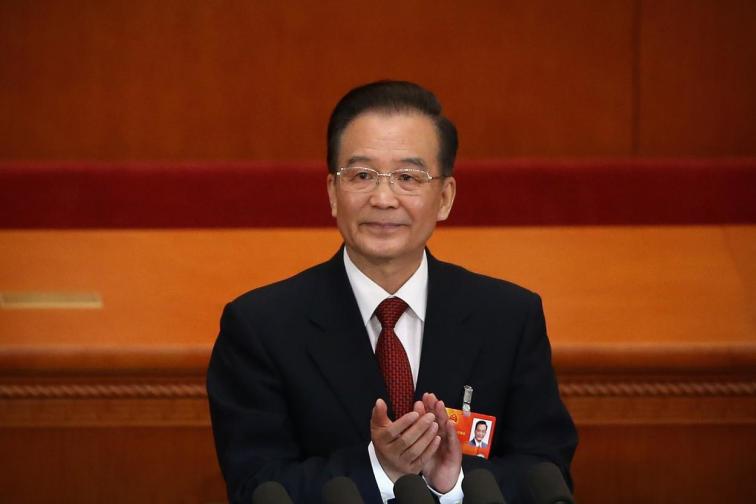Dark clouds hang over Tiananmen Square in Beijing. (Lintao Zhang/Getty Images)
[People News] The movement to depose Xi Jinping, jointly orchestrated by CCP party elders and military leaders, is accelerating rapidly. Xi has not only lost all real power, but his personal situation has taken a sudden and dramatic turn for the worse. Online sources claim that during an expanded Politburo meeting held around May 14, Xi was harshly criticised to the point of total humiliation and defeat, utterly unable to respond, reportedly reduced to kneeling and begging for mercy.
For Xi Jinping, the current political climate is not just bad — it keeps getting worse.
Party Media Shockingly Calls for Succession on June 1
On June 1, China's state-run news agency Xinhua, under the pretext of celebrating International Children’s Day, prominently featured a striking anti-Xi slogan. In a bold, black headline set in the largest possible font, Xinhua published the quote from “Studying Xi’s Speeches”: “Always be prepared to take over in the future.”
Was this satire mocking Xi, or a calculated signal of an impending political storm? It appears to be a strong indication that the political establishment may be preparing to remove him at any moment.
This quote comes from a speech Xi made early in his first term, on May 30, 2014, while visiting Minzu Primary School in Haidian District, Beijing, to mark Children’s Day. At that time, Xi had just come to power and still appeared modest and pragmatic; his authoritarian ambitions were not yet exposed. Thus, the term “succession” was not a political taboo. However, after that year, this phrase never again appeared in state media headlines.
Since Xi’s unprecedented third term, words like “succession” and even “New Year’s Eve” (除夕, which sounds like “eliminating Xi”) have become the most sensitive terms in the Chinese language. The entire country even endured several bizarre years of working on Lunar New Year's Eve to avoid using the term. After purging a string of designated successors — including Sun Zhengcai, Hu Chunhua, Chen Min’er, and Li Keqiang — no one dared mention “succession” inside the Party. The media certainly wouldn't dare violate Xi’s taboos. According to reports, more than 20,000 police officers are assigned to monitor online speech regarding Xi.
Yet now, Xinhua, the CCP’s flagship media outlet, has boldly displayed the word “succession” in a headline, paired with “always be prepared.” Is Cai Qi (Director of the General Office of the CCP) confused? No — he's finally awakened. The political tide has turned. The once-loyal Cai, who pushed for Xi Jinping Thought to be deeply “internalised, understood, and embraced,” is now making his stance clear. He may soon follow the example of Wang Dongxing (Mao’s former bodyguard who betrayed the Gang of Four after Mao's death).
The CCP’s internal political dynamics resemble a deep-sea earthquake. The ocean floor has already been overturned, and when the waves reach the shore, it will only take seconds to cause a tsunami. Since the Third Plenary Session last year, the anti-Xi faction has taken decisive action by purging Xi’s top military loyalists Miao Hua and He Weidong — effectively cutting off the base of Xi’s power. Real control over the military and political apparatus now lies with figures such as Hu Jintao, Wen Jiabao, Zhang Youxia, and Shi Taifeng. The Fourth Plenary Session is expected to formally announce Xi’s ousting. If Xi resists, his downfall could occur at any moment.
No Politburo Meeting in May — Shockwaves of Anti-Xi Mobilisation
Unusually, the CCP did not hold a Politburo meeting in May. The April meeting, chaired by Xi, focused on the economy under U.S.–China trade tensions. Despite Xi’s declining authority, he still tried to maintain control over economic affairs, preaching “bottom-line thinking” and vowing to fight the trade war to the end.
However, in early May, the CCP abruptly softened its stance, sending a delegation to Geneva, Switzerland, for trade talks with the U.S. The results showed that China made major concessions, reducing tariffs on U.S. goods to just 10%, while U.S. tariffs remained at 30%. China also promised to ease restrictions on rare earth exports. Observers believe this outcome starkly contradicts Xi’s confrontational policy and suggests that the anti-Xi faction now holds real power, bypassing Xi to instruct representatives like Li Chenggang to compromise with the U.S. Xi is losing control over both economic and foreign policy.
The absence of the May Politburo meeting further fuels speculation that Xi has completely lost his grip on power. Political shifts in May were especially turbulent: The Tuanpai faction (Communist Youth League faction) made a strong comeback, Wang Yang and Hu Chunhua appeared to be frontrunners to succeed Xi, An extraordinary expanded Politburo meeting targeted Xi directly, Cai Qi broke down in tears, renounced his loyalty and defected, The General Office issued a document opposing leftist tendencies, clearly targeting Xi, The entire Party was instructed to guard against the "Xi toxin" (習毒). Cornered, Xi fled to Henan to “seek blessings from Buddha,” and then mysteriously disappeared from public view for several days.
Xi Jinping Loses Control Over Hong Kong, Macau, and Taiwan Affairs
Even based on publicly available information, signs of Xi Jinping's waning power have been increasingly evident. On May 29, China’s State Council announced the removal of Qiu Kaiming from his position as Deputy Director of the Taiwan Affairs Office of the State Council, appointing Zhao Shitong as his replacement.
According to public records, Qiu Kaiming earned his PhD in international relations from the Department of International Politics at Fudan University in 1992. His doctoral dissertation was titled A Socio-Political Analysis of Taiwan’s Economic Growth. He held various positions, including Director of the Information Center of the Taiwan Work Office of the CCP Central Committee and the Taiwan Affairs Office of the State Council, Director of the Association for Relations Across the Taiwan Straits (a semi-official think tank), and Director of the Research Bureau of the CCP Central Taiwan Work Office and the Taiwan Affairs Office. In November 2023, at the age of 59, Qiu Kaiming was serving as Deputy Director of both the CCP Central Taiwan Work Office and the State Council’s Taiwan Affairs Office. During his time in graduate school, Wang Huning was the head of the International Politics Department at Fudan University—making it clear that Qiu was Wang Huning’s protégé and a loyal implementer of Xi Jinping’s Taiwan policy. His removal from the Taiwan Affairs Office suggests that Xi is losing his grip on Taiwan-related policymaking.
Late at night on May 30, the State Council made another rare personnel move, announcing the dismissal of Zheng Yanxiong from his post as Director of the Hong Kong and Macao Affairs Office. He was replaced by Zhou Ji, a deputy director in charge of day-to-day operations. Since the anti-extradition protests and the imposition of the Hong Kong National Security Law, Zheng Yanxiong had been regarded as a staunch enforcer of Xi’s hardline policy toward Hong Kong. In August 2020, the U.S. Department of the Treasury sanctioned Zheng and ten other mainland and Hong Kong officials for undermining Hong Kong’s autonomy, banning them from entering the United States.
Both Qiu Kaiming and Zheng Yanxiong were deeply involved in implementing CCP policy toward Hong Kong, Macau, and Taiwan, as well as in China’s geopolitical strategy in the Indo-Pacific region and U.S.-China relations—areas of significant importance. Their removal suggests that senior party elders no longer wish to allow Xi Jinping to continue destabilising Taiwan and Hong Kong, tarnishing China’s international image, or undermining the regime’s global political standing. They are no longer willing to let Xi drag everyone into a war over Taiwan to fulfil his personal ambition of rivalling Mao Zedong—even if that means risking a full-scale conflict with the United States. Xi Jinping’s dream of forcibly reunifying Taiwan has been completely shattered along with the collapse of his political power.
Shangri-La Dialogue: A Curse for CCP Defence Ministers
The 22nd Shangri-La Dialogue, held in Singapore from May 30 to June 1, drew over 550 defence and security officials from more than 40 countries. China, previously eager to compete with the U.S. for Indo-Pacific influence, did not send its defence minister — an unusual move. Instead, Major General Hu Gangfeng, deputy president of the PLA National Defence University, led the delegation.
Previously, signals had emerged that Dong Jun, the defence minister, would not attend. Analysts suggest that the internal power struggle in the military explains this downgrade. Xi has lost control of the PLA. His confidant, He Weidong, has vanished for months, and 22 out of 79 generals Xi promoted have already fallen. More are expected to follow. How could Xi wage war on Taiwan under such conditions? Party elders understand this reality and are likely lowering the delegation's profile to avoid a direct clash with U.S. Secretary of Defence Lloyd Austin.
Furthermore, the Shangri-La Dialogue has become a “curse” for Chinese defence ministers: Both Wei Fenghe and Li Shangfu made tough anti-U.S. speeches there, and were later purged. Dong Jun remains in office likely because he became a key witness against Miao Hua. If he attended the event and repeated Xi’s hardline rhetoric, he might also be taken down.
Sure enough, at the dialogue, Lloyd Austin directly accused China of preparing for a military invasion of Taiwan. China's response was tepid: the Foreign Ministry issued a weak statement the next day, and the Defence Ministry’s spokesman Zhang Xiaogang merely parroted standard lines.
This year's Shangri-La Dialogue showed one thing clearly: Xi Jinping has completely lost control of military diplomacy.
(First published by People News)











News magazine bootstrap themes!
I like this themes, fast loading and look profesional
Thank you Carlos!
You're welcome!
Please support me with give positive rating!
Yes Sure!